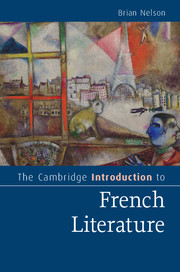Book contents
- Frontmatter
- Dedication
- Contents
- Preface
- Acknowledgements
- Chronology
- 1 Villon: a dying man
- 2 Rabelais: the uses of laughter
- 3 Montaigne: self-portrait
- 4 Corneille: heroes and kings
- 5 Racine: in the labyrinth
- 6 Molière: new forms of comedy
- 7 La Fontaine: the power of fables/fables of power
- 8 Madame de Lafayette: the birth of the modern novel
- 9 Voltaire: the case for tolerance
- 10 Rousseau: man of feeling
- 11 Diderot: the enlightened sceptic
- 12 Laclos: dangerous liaisons
- 13 Stendhal: the pursuit of happiness
- 14 Balzac: ‘All is true’
- 15 Hugo: the divine stenographer
- 16 Baudelaire: the streets of Paris
- 17 Flaubert: the narrator vanishes
- 18 Zola: the poetry of the real
- 19 Huysmans: against nature
- 20 Mallarmé: the magic of words
- 21 Rimbaud: somebody else
- 22 Proust: the self, time and art
- 23 Jarry: the art of provocation
- 24 Apollinaire: impresario of the new
- 25 Breton … Company: Surrealism
- 26 Céline: night journey
- 27 Sartre: writing in the world
- 28 Camus: a moral voice
- 29 Beckett: filling the silence
- 30 French literature into the twenty-first century
- Notes
- Further reading
- Index of authors and titles
- Index of genres, movements and concepts
- Cambridge Introductions to …
- References
8 - Madame de Lafayette: the birth of the modern novel
Published online by Cambridge University Press: 05 July 2015
- Frontmatter
- Dedication
- Contents
- Preface
- Acknowledgements
- Chronology
- 1 Villon: a dying man
- 2 Rabelais: the uses of laughter
- 3 Montaigne: self-portrait
- 4 Corneille: heroes and kings
- 5 Racine: in the labyrinth
- 6 Molière: new forms of comedy
- 7 La Fontaine: the power of fables/fables of power
- 8 Madame de Lafayette: the birth of the modern novel
- 9 Voltaire: the case for tolerance
- 10 Rousseau: man of feeling
- 11 Diderot: the enlightened sceptic
- 12 Laclos: dangerous liaisons
- 13 Stendhal: the pursuit of happiness
- 14 Balzac: ‘All is true’
- 15 Hugo: the divine stenographer
- 16 Baudelaire: the streets of Paris
- 17 Flaubert: the narrator vanishes
- 18 Zola: the poetry of the real
- 19 Huysmans: against nature
- 20 Mallarmé: the magic of words
- 21 Rimbaud: somebody else
- 22 Proust: the self, time and art
- 23 Jarry: the art of provocation
- 24 Apollinaire: impresario of the new
- 25 Breton … Company: Surrealism
- 26 Céline: night journey
- 27 Sartre: writing in the world
- 28 Camus: a moral voice
- 29 Beckett: filling the silence
- 30 French literature into the twenty-first century
- Notes
- Further reading
- Index of authors and titles
- Index of genres, movements and concepts
- Cambridge Introductions to …
- References
Summary
… so great was her perplexity that she resolved to avoid the very thing she perhaps most desired in all the world.
– Madame de Lafayette, La Princesse de ClèvesLa Princesse de Clèves (1678), by Marie-Madeleine de Lafayette (1634–93), is generally regarded by literary historians as the first modern novel in French. This may seem surprising given the novel's historical setting: the aristocratic milieu of King Henri II (reign: 1547–59) and his court. The novel's modernity consists in its unprecedented emphasis, in prose narrative, on psychological analysis, and its authentic representation of life at the royal court. Combining elements of the romance and the novella – prose genres that were previously dominant – La Princesse de Clèves created a new model for fiction: the type of psychological novel (roman d'analyse), foregrounding the inner lives of its characters and the relationships between them, that would become such an important strand of the French literary tradition. It looks forward to the fiction of Laclos and Stendhal.
The beautiful young heroine, the sixteen-year-old Mlle de Chartres, attracts much attention when she is presented at court by her mother. Her mother soon marries her to the Prince de Clèves, a man her daughter respects but does not love. No sooner is she married than she meets the Duke de Nemours, the most brilliant and attractive nobleman in the King's entourage and notorious for his affairs with women. Nemours falls violently in love with her. The princess avoids him as much as she can, but finds herself becoming irresistibly attracted to him. Forced to recognize that she is powerless in the face of her passion, and wishing to preserve her virtue by withdrawing from the court, she turns to her husband for help and confesses to him that she is in love with another man, whom she refuses to name.
- Type
- Chapter
- Information
- The Cambridge Introduction to French Literature , pp. 54 - 59Publisher: Cambridge University PressPrint publication year: 2015

